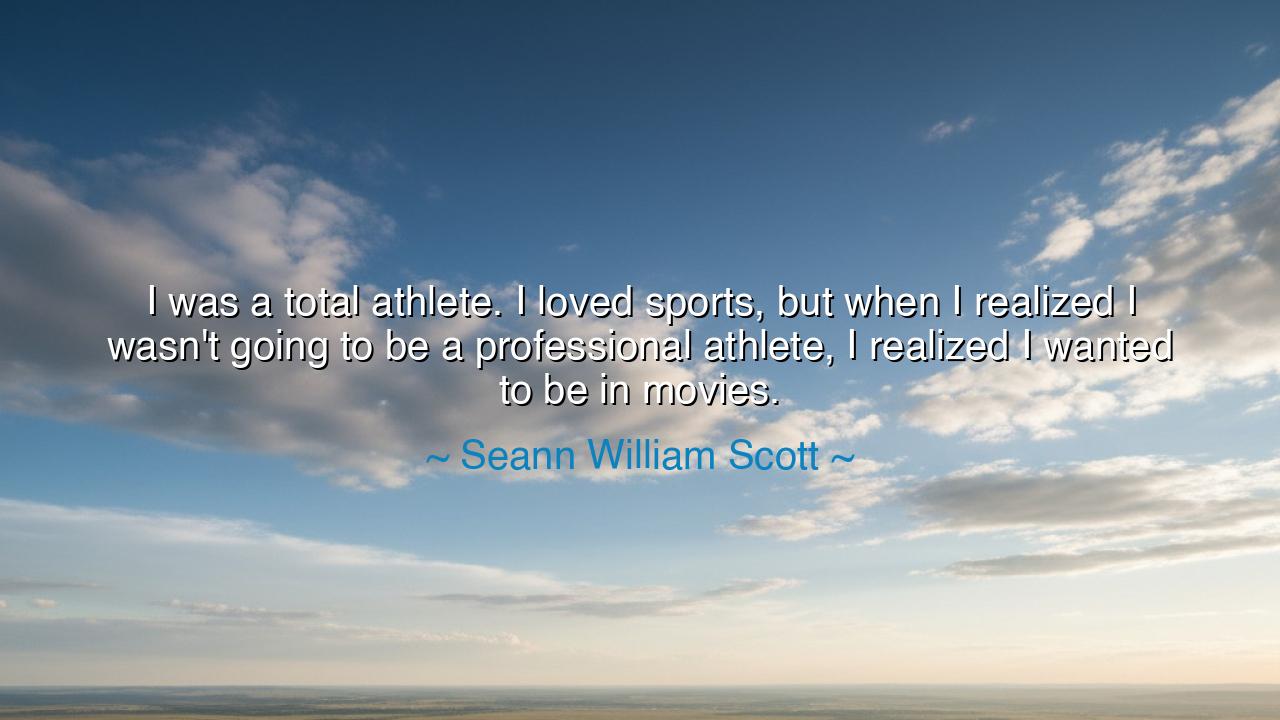
I was a total athlete. I loved sports, but when I realized I
I was a total athlete. I loved sports, but when I realized I wasn't going to be a professional athlete, I realized I wanted to be in movies.






"I was a total athlete. I loved sports, but when I realized I wasn't going to be a professional athlete, I realized I wanted to be in movies." These words from Seann William Scott capture a pivotal moment in the human journey—the realization that passions may change, but the desire to pursue something meaningful does not. Scott’s story is a reflection of a common truth: our paths in life are not always linear. Sometimes, the dreams we hold dear from youth must give way to the reality of our abilities and circumstances. And yet, even when one door closes, another opens. The transition from athlete to actor is not just about changing careers; it is about redefining success, finding new passions, and pursuing greatness in different forms.
In the ancient world, the notion of switching from one path to another was seen as a great transformation. Consider the story of Hercules, the great hero of Greek mythology. Born with immense strength, Hercules was destined for greatness in battle and feats of physical prowess. Yet, it was through his trials—the labors he undertook—that he found his true calling. His journey was not just about conquering external foes, but about understanding himself, growing beyond his physical abilities, and finding his place in the world. Just as Scott was a total athlete, Hercules’ journey was a reminder that strength alone does not define greatness; sometimes, greatness comes from discovering a deeper calling, a different kind of power that lies beyond the physical realm.
Similarly, the Romans had their own examples of transformation. Cicero, the great orator and statesman, was a man who, though trained in the ways of physical combat and public affairs, found his true purpose in the realm of philosophy and speech. Cicero’s journey illustrates that one’s greatest impact is not always in the arena of physical strength, but often in the realm of words and ideas. This was a shift, a redefinition of his identity, as Scott made when he pivoted from sports to acting. The Romans valued adaptability and the ability to excel in many areas, and in this sense, both Cicero and Scott exemplify the ancient wisdom that our true power lies not in staying on one fixed path, but in finding the courage to pursue what calls us.
The shift from athlete to actor is not merely a change in career—it is a form of rebirth. Alexander the Great, after establishing his empire, did not simply rule through military conquest. His ambition was rooted in a desire to spread culture and create something lasting. He encouraged the exchange of ideas and arts between East and West, showing that his true legacy would not rest only on the battlefields but on the cultural influence he spread across the world. Alexander's path illustrates the idea that success and legacy are multifaceted. Just as Seann William Scott turned from sports to acting, Alexander evolved from a warrior to a visionary—a figure who understood that there is more than one way to achieve greatness.
In the same way, Scott’s realization that his future lay in movies rather than sports speaks to the timeless human trait of adaptability. We often envision a singular path to success: an athlete dreams of making it to the big leagues, an artist envisions a masterpiece, a philosopher imagines great debates in the halls of power. Yet, life is filled with unexpected turns, and sometimes, we must let go of our dreams to embrace new ones. The true test of character is not whether we follow the same course we once set, but whether we can pivot, adapt, and pursue greatness wherever it may lead us.
The lesson to take from Scott’s reflection is one of resilience and self-awareness. We may be drawn to a particular path or dream early in life, but as we grow, we may find that other possibilities offer greater fulfillment or meaning. The key is to recognize that passion for one pursuit can be a springboard to success in another. Seann William Scott may have loved sports, but he understood that his talent and passion could be applied to a new realm—acting—where he could still express himself, still excel, and still find purpose. This is a reminder to us all that our true calling may not always come in the form we first imagined, but we must stay open to the opportunities that arise along the way.
In practical terms, we can take a lesson from Scott’s journey: adaptability is a vital tool for success. When faced with a change in direction, it is crucial not to see it as failure, but as an opportunity to reinvent ourselves. Whether in our careers, relationships, or personal goals, the ability to pivot and embrace new possibilities is often the key to long-term success. Like Alexander or Cicero, we must understand that greatness is not defined by a single pursuit, but by the ability to evolve, to adapt, and to grow in new directions. Life is an ongoing journey of discovery, and sometimes, the path to our highest potential is not the one we envisioned at first, but the one we create as we go along.






AAdministratorAdministrator
Welcome, honored guests. Please leave a comment, we will respond soon